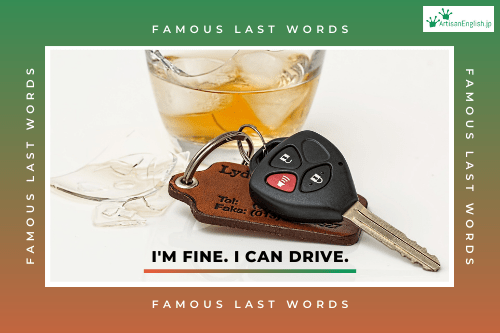
(Photo: Steve Buissinne/Pixabay | Text: David/ArtisanEnglish.jp)
YouTube / iTunes / Spotify / Radio Public / Pocket Casts / Google Podcasts / Breaker / Overcast
Listen to ArtisanEnglish.jp posts & lesson intros here.
Phrase: Famous last words
Confidence and belief in yourself are both essential for success in life.
Overconfidence, however, could lead to tragic results.
When others are aware of your overconfidence and are sure you will later be proved wrong, that’s when they use the phrase famous last words.
They can use it immediately after you speak or even years after the fact.
To use the phrase famous last words is to make an ironic comment about someone’s overconfidence.
How many drunk drivers asserted they were perfectly capable of driving before they got behind the wheel of a car, killed someone, themselves or ruined many lives forever?
That’s why I chose to caption today’s image, ‘I’m fine, I can drive.’
How many people have stepped out on their spouses while saying, ‘S/he’ll never know’ only soon after to find themselves in divorce court with their whole life crashing down about their ears?
These are famous last words.
Whether you use the phrase at the time or later after the facts have been revealed, it is still an ironic comment on the disaster that comes out of overconfidence.
Arrogance has led to the downfall of many a man and woman.
Being proved wrong is truly embarrassing, but then to have your own words used against you by being labelled ‘famous last words‘ only adds insult to injury.
If you don’t want your own words used against you as famous last words ironically foreshadowing a personal disaster, try not to be overconfident.
Yes, confidence is good, but when people give you advice, take it and consider it carefully.
It would be tragic if what you said next became your own famous last words.
Flesch-Kincaid Readability Test
This post is understandable by someone with at least an 8th-grade education (age 13 – 14).
On the Flesch-Kincaid reading-ease test, this post scores 65.
The easier a passage is to read, the higher the score on a scale of 0 – 100.

